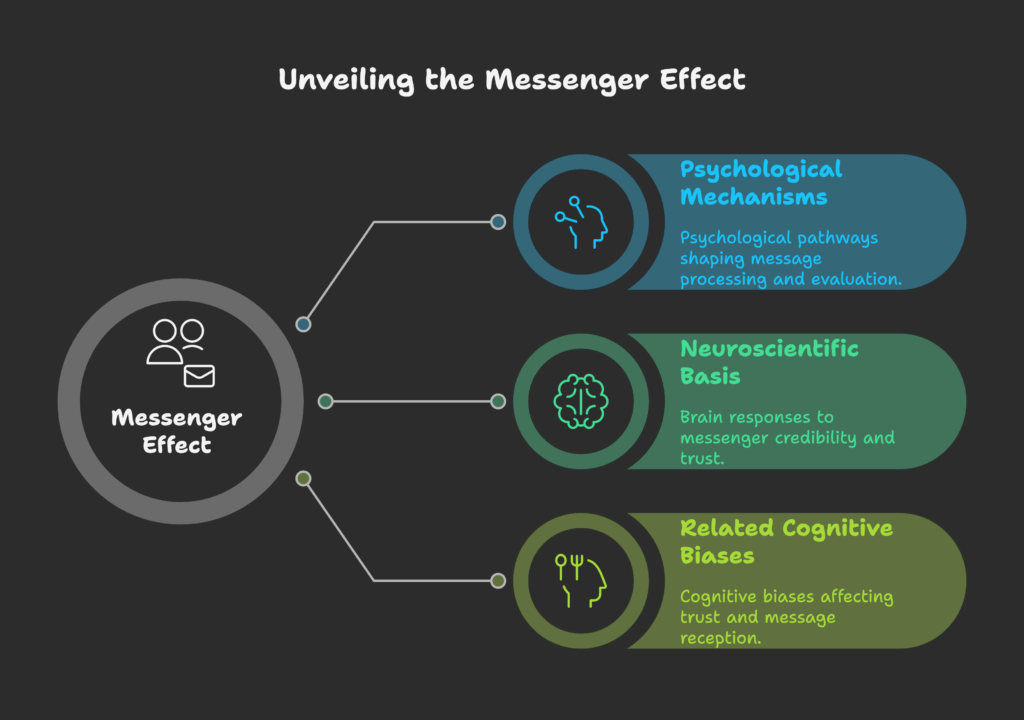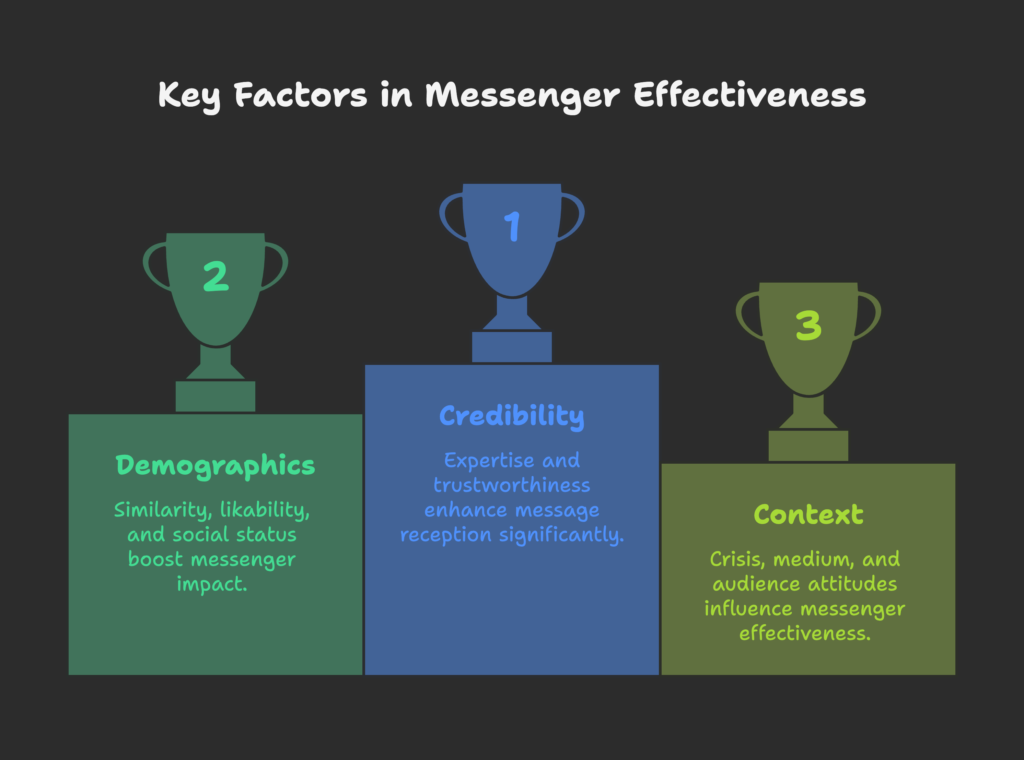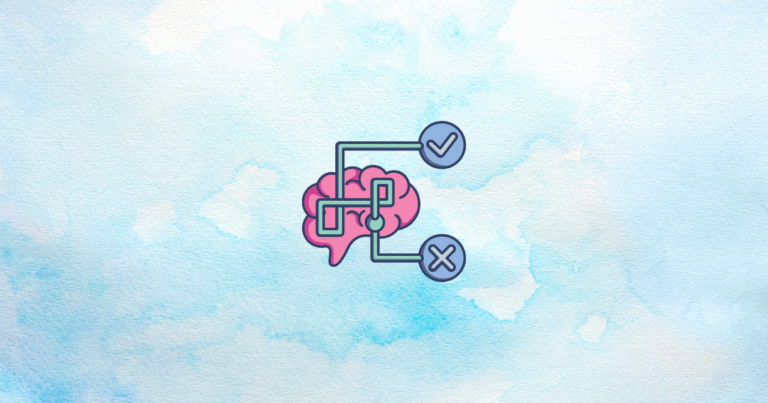Have you ever wondered why some messages stick while others are quickly forgotten? Or why the same advice feels more valuable coming from one person than another? The secret might not be in what is being said, but who is saying it.
Think about it: Would you be more likely to take financial advice from a successful entrepreneur or from someone who has never managed money? Would health tips from a doctor carry more weight than the same advice from a random social media account?
This powerful phenomenon—where the messenger can be more influential than the message itself—shapes our decisions every day, often without us even realizing it. And for businesses and communicators, understanding this “Messenger Effect” can be the difference between a message that resonates and one that falls flat.
By reading this article, you’ll discover:
- Why we’re naturally wired to judge messages based on who delivers them
- The science behind which messengers are most effective (and when)
- How businesses and organizations can strategically choose the right messengers
- Practical ways to apply these insights to your own communication
Ready to transform how your messages are received? Let’s dive in!
Introduction to the Messenger Effect
Before we can harness the power of the Messenger Effect, we need to understand what it is and why it matters. In this section, we’ll explore the concept, its business relevance, and the key questions researchers are investigating.
Conceptual Framework and Definitions
At its core, the Messenger Effect is a cognitive bias where the perceived credibility, expertise, or likability of the message source (the messenger) significantly influences how the message itself is received and processed. This effect has deep historical roots in persuasion psychology, dating back to concepts like Hovland’s source credibility theory, which explored how expert sources could increase message acceptance.
Today, we see the Messenger Effect’s powerful applications across marketing campaigns, public policy initiatives, and health communication strategies. It’s the reason celebrity endorsements work, why doctors appear in medical advertisements, and why companies carefully select their spokespeople.
The Business and Social Relevance
The Messenger Effect isn’t just an academic concept—it has real-world implications for businesses and organizations:
- Consumer Trust: Research shows that approximately 70% of consumers trust recommendations from peers more than branded content. This explains the rising power of user reviews and testimonials in purchasing decisions.
- Crisis Communication: During organizational crises, the right messenger can mean the difference between regaining public trust or suffering lasting reputation damage.
- Political Campaigns: Election outcomes can hinge on which candidate’s messengers resonate most with undecided voters.
- Organizational Leadership: Internal communications become significantly more effective when delivered by trusted figures within the company.
Beyond business applications, the Messenger Effect has ethical implications. When organizations strategically select messengers based on their persuasive power rather than their genuine expertise, they may cross ethical boundaries.
Key Research Questions
As researchers continue to explore the Messenger Effect, three critical questions drive the field forward:
- How does messenger identity shape a message’s effectiveness across different contexts?
- What psychological mechanisms drive our tendency to evaluate content based on its source?
- How can organizations strategically select messengers to optimize outcomes while maintaining ethical standards?
We’ve seen how the messenger can sometimes outweigh the message itself—but why does our brain work this way? Let’s explore the fascinating psychological foundations that make us so susceptible to the messenger’s influence.
Theoretical Foundations of the Messenger Effect
To truly master the Messenger Effect, we need to understand what’s happening in our minds when we process messages from different sources. In this section, we’ll explore the psychology, neuroscience, and cognitive biases that explain why messengers matter so much.

Psychological Mechanisms
Our brains process messages through several psychological pathways:
- Dual-Process Models: According to frameworks like the Elaboration Likelihood Model (ELM) and the Heuristic-Systematic Model (HSM), we process information either through careful analysis (the central/systematic route) or through mental shortcuts (the peripheral/heuristic route). When we’re short on time or motivation, we rely more heavily on cues like messenger credibility.
- Cognitive Heuristics: We use mental shortcuts like authority bias (trusting experts) and the similarity-liking principle (preferring messages from people similar to us) to quickly evaluate information without deep analysis.
- Emotional Contagion: The emotional state of the messenger can actually “infect” how we feel about the message. A confident, enthusiastic messenger makes the content itself seem more valuable and trustworthy.
Neuroscientific Basis
Modern neuroscience has revealed fascinating insights into how our brains physically respond to different messengers:
- The prefrontal cortex—our brain’s “executive center”—shows increased activity when we’re assessing a messenger’s credibility.
- Our brain’s reward system releases dopamine when we receive messages from trusted sources, creating a positive association.
- fMRI studies have shown that the amygdala (associated with threat detection) activates when processing messages from untrusted sources, triggering skepticism.
Related Cognitive Biases
The Messenger Effect interacts with several other cognitive biases that shape our perception:
- Halo Effect: When a messenger is attractive or credible in one area, we subconsciously attribute other positive qualities to them and their message.
- Confirmation Bias: We tend to trust messengers who confirm our existing beliefs, creating echo chambers of reinforced opinions.
- Authority Bias: We show excessive deference to the opinions of figures we perceive as authorities, sometimes overlooking flaws in their messages.
Now that we understand why messengers matter psychologically, let’s explore what makes some messengers more effective than others. What qualities should you look for when choosing who delivers your important messages?
Factors Influencing Messenger Effectiveness
Not all messengers are created equal. In this section, we’ll examine the specific qualities that make certain messengers particularly persuasive, from their credibility to their demographic traits to the context in which they deliver their message.

Messenger Credibility
Credibility stands as perhaps the most crucial factor in messenger effectiveness, consisting of two key components:
- Expertise: A messenger’s perceived knowledge and qualifications dramatically impact message reception. This is why doctors appear in health campaigns and why financial services feature advisors with impressive credentials.
- Trustworthiness: Beyond knowledge, audiences must believe the messenger is honest and has their best interests at heart. This explains why many people trust NGOs more than corporate spokespeople on social issues.
A compelling case study of credibility’s impact can be seen in COVID-19 messaging. In many countries, public health officials like Dr. Fauci in the US were generally perceived as more trustworthy sources of pandemic information than political figures, whose messages were often seen through a partisan lens.
Demographic and Psychographic Factors
Beyond credibility, several personal characteristics influence a messenger’s effectiveness:
- Similarity: We tend to trust messengers who share our demographics (race, gender, age) or cultural background. This is why diverse representation in messaging is not just ethically important but pragmatically effective.
- Likability: Charismatic, relatable messengers often succeed where equally credible but less appealing messengers fail. This underlies the rise of influencer marketing, where relatability often trumps traditional authority.
- Social Status: Celebrity endorsements leverage our tendency to value messages from high-status individuals, though research shows that everyday users (particularly peers) may actually be more trusted in many contexts.
Contextual Factors
The situation surrounding a message significantly impacts which messenger will be most effective:
- Crisis vs. Non-Crisis: During crises (like the Huawei security concerns), audiences often prefer direct communication from top leadership rather than marketing representatives.
- Medium of Delivery: A messenger who excels in face-to-face communication might struggle to convey the same trustworthiness on social media platforms, and vice versa.
- Audience Pre-existing Attitudes: In politically polarized environments, messenger selection becomes particularly tricky, as the same source might boost credibility with one audience segment while undermining it with another.
Now that we understand what makes messengers effective, let’s examine how different industries and sectors are applying these insights in the real world. How are marketers, policy makers, and organizational leaders leveraging the power of the right messenger?
Applications Across Domains
The Messenger Effect isn’t just theoretical—it’s being applied across various fields today. In this section, we’ll explore concrete examples of how businesses, governments, and organizations are strategically selecting messengers to maximize their impact.
Marketing and Advertising
In the competitive world of marketing, messenger selection can make or break a campaign:
- Influencer Marketing: Brands are increasingly partnering with social media personalities who have dedicated followings. Interestingly, research shows that micro-influencers (with smaller but highly engaged audiences) often generate higher engagement rates than celebrities, as they’re perceived as more authentic and relatable.
- Celebrity Endorsements: While still powerful, celebrity partnerships work best when there’s perceived authenticity. Nike’s controversial but ultimately successful campaign with Colin Kaepernick succeeded largely because consumers believed in the genuine alignment between Kaepernick’s values and the message.
- User-Generated Content: Many brands now showcase real customer testimonials and reviews, leveraging the power of peer messengers to build trust. Studies show that 88% of consumers trust online reviews as much as personal recommendations.
Public Policy and Health Communication
When it comes to communicating important public information, messenger selection is particularly crucial:
- Vaccine Advocacy: Research demonstrates that healthcare providers remain the most trusted source for vaccine information, with scientists generally more trusted than politicians on health matters.
- Anti-smoking Campaigns: Compelling evidence suggests that testimonials from former smokers or cancer survivors typically outperform institutional messaging about smoking risks, highlighting the power of authentic, relatable messengers.
- Pandemic Communication: During COVID-19, a fascinating pattern emerged: while the World Health Organization provided global guidance, local leaders often proved more effective at driving behavioral change within specific communities, demonstrating the importance of cultural proximity.
Organizational Leadership
Within companies, the right messenger can transform organizational culture and performance:
- CEO Messaging During Crises: Satya Nadella’s visible leadership during Microsoft’s turnaround demonstrated how the CEO as messenger can rebuild trust and chart a new direction. His authentic communication style marked a deliberate departure from previous leadership approaches.
- Internal Communication: Research shows that important organizational changes may be better received when communicated through direct managers rather than distant executives, while peer-to-peer communication often drives stronger adoption of new practices.
- Ethical Leadership: Companies increasingly recognize the importance of transparency about who’s delivering messages and why they were selected, particularly for sensitive topics.
These applications show the Messenger Effect in action—but how do we know if our messenger choices are actually working? Let’s explore the fascinating ways researchers and organizations measure messenger impact.
Measuring Messenger Impact
To optimize messenger selection, we need reliable ways to measure effectiveness. This section explores cutting-edge tools and methodologies for assessing how different messengers influence message reception.
Neuroscientific Tools
Advanced brain imaging and monitoring techniques are revealing unprecedented insights into messenger effects:
- fMRI Studies: Functional magnetic resonance imaging allows researchers to observe which brain regions activate when participants receive messages from different sources. These studies have shown that messages from trusted sources activate reward centers, while untrusted messengers trigger skepticism circuits.
- EEG Metrics: Electroencephalography measures electrical activity in the brain, allowing researchers to track emotional engagement with different messengers in real-time. This helps identify which messengers create stronger emotional connections.
Behavioral Metrics
Beyond brain activity, practical behavioral measurements provide valuable insights:
- A/B Testing: Digital campaigns can easily test different messengers by randomly assigning audiences to variants and measuring which drives higher engagement, conversions, or other desired outcomes.
- Surveys and Scales: Likert scales measuring perceived credibility, trustworthiness, and message acceptance help quantify messenger effects, with follow-up studies tracking behavior change over time.
Case Study: Experimental Design
A fascinating case study on Huawei’s crisis communication in the U.S. demonstrates how messenger effects can be systematically studied:
- Researchers tested how audiences responded to identical messages about Huawei’s security concerns when delivered by messengers from different countries (Russian vs. U.K. sources).
- The study found that messenger nationality significantly impacted credibility perception, with U.K. messengers generally viewed as more trustworthy by American audiences.
- Importantly, the research also revealed that media skepticism moderated these effects, with highly skeptical consumers showing less variation in their responses to different messengers.
While the power of strategic messenger selection is clear, it also raises important ethical questions. Let’s examine the challenges and responsibilities that come with wielding this influential tool.
Challenges and Ethical Considerations
With great power comes great responsibility. In this section, we’ll explore the ethical complexities, potential pitfalls, and cross-cultural challenges of leveraging the Messenger Effect.
Ethical Risks
Organizations must navigate several ethical concerns when strategically selecting messengers:
- Manufactured Credibility: The practice of paying experts to endorse products or ideas they may not genuinely support raises serious ethical questions. When pharmaceutical companies pay doctors to promote medications or food companies fund nutritionists to endorse products, audiences deserve transparency about these relationships.
- Exploitation of Vulnerable Populations: Targeting specific demographic groups with carefully selected messengers can be particularly problematic when aimed at vulnerable populations like children, the elderly, or low-income communities who may be less equipped to critically evaluate persuasion attempts.
Cognitive Bias Pitfalls
The Messenger Effect can inadvertently reinforce problematic patterns of thinking:
- Confirmation Bias Reinforcement: When we selectively trust messengers who align with our existing beliefs, we risk creating echo chambers that further polarize discourse and inhibit critical thinking.
- Over-reliance on Authority: Excessive deference to authority figures can lead audiences to accept messages without proper scrutiny, potentially allowing misinformation to spread even from well-intentioned but misinformed experts.
Cross-Cultural Nuances
Messenger effects vary significantly across cultural contexts:
- Messenger Nationality: Research on Huawei’s communication strategies revealed how distrust of foreign sources can significantly impact message reception, highlighting the importance of cultural sensitivity in global communications.
- Cultural Authority Structures: In some developing nations, local community leaders may carry more influence than global figures, while in others, international expertise may be more valued. These cultural differences require nuanced messenger selection strategies.
Given these challenges, how can organizations select messengers effectively and ethically? Let’s explore practical strategies for optimizing messenger selection in various contexts.
Strategies for Optimizing Messenger Selection
Now that we understand the power and pitfalls of the Messenger Effect, let’s explore practical frameworks for selecting the right messengers for your messages.
Audience-Centric Frameworks
Effective messenger selection begins with a deep understanding of your audience:
- Demographic Mapping: Create detailed profiles of your target audience segments and identify messengers whose characteristics align with each segment. This could involve matching messengers based on age, profession, cultural background, or life experiences.
- Pre-Testing: Before launching a major campaign, use focus groups or surveys to assess how your target audience perceives potential messengers. This allows you to measure relatability, trustworthiness, and perceived expertise before making final decisions.
Multi-Messenger Approaches
Rather than relying on a single messenger, consider strategic combinations:
- Echo Chamber Mitigation: Combine expert messengers with peer messengers to create a more balanced and persuasive approach. For example, a health campaign might feature both medical professionals explaining the science and everyday people sharing personal experiences.
- Sequential Messaging: Deploy different messengers at different stages of your communication strategy. Experts might establish credibility and explain complex concepts initially, while peers drive adoption and behavioral change in later stages.
Crisis Communication Protocols
When stakes are high during organizational crises, messenger selection becomes especially critical:
- Unified Messaging: Ensure consistency across all organizational spokespeople by establishing clear talking points and coordination protocols. Mixed messages from different organizational representatives can severely undermine trust.
- Third-Party Validators: Identify and engage neutral, respected third parties who can verify your organization’s claims. During product safety concerns, for instance, independent testing laboratories can serve as powerful trust-building messengers.
The field of messenger selection continues to evolve rapidly with new technologies and research insights. Let’s look ahead to see what innovations might shape the future of this powerful communication tool.
Future Directions and Innovations
The Messenger Effect is entering a new era of sophistication and complexity. In this final section, we’ll explore emerging technologies, neuroscience applications, and regulatory trends that will shape how messengers are selected and deployed in the coming years.
AI and Personalization
Artificial intelligence is revolutionizing messenger selection:
- Algorithmic Matching: Advanced algorithms can now analyze audience profiles and automatically match them with optimal messengers based on thousands of data points. These systems continuously learn from interaction data to improve messenger selection over time.
- Synthetic Influencers: The rise of AI-generated “virtual influencers” like Lil Miquela (with millions of followers) raises fascinating questions about authenticity and the future of messenger credibility. When the messenger isn’t even human, how do traditional trust markers apply?
Neuro-Informed Strategies
Advances in neuroscience are creating more sophisticated ways to optimize messenger impact:
- Biometric Feedback: Eye-tracking, facial expression analysis, and other biometric tools allow organizations to measure subtle reactions to different messengers, optimizing selection based on unconscious responses rather than just self-reported preferences.
- VR Simulations: Virtual reality technologies are enabling immersive testing environments where researchers can study messenger-audience interactions in controlled but realistic scenarios, accelerating the refinement of messenger selection strategies.
Global and Regulatory Trends
The regulatory landscape around messengers is evolving rapidly:
- Transparency Legislation: Many jurisdictions are implementing stricter requirements for disclosure of sponsored content and messenger relationships. The future likely holds even more comprehensive rules about how messenger selection must be communicated to audiences.
- Cross-Cultural Messenger Training: Organizations are developing sophisticated programs to prepare messengers for effective communication across cultural boundaries, recognizing that globalization requires more nuanced approaches to messenger selection.
As we’ve seen throughout this article, the Messenger Effect is a powerful force that shapes how all communications are received. By understanding its psychological foundations, measuring its impact, addressing its ethical challenges, and implementing strategic frameworks, organizations can ensure their important messages reach receptive audiences through the most effective channels.
Growth Reminder: Looking to boost your Shopify store’s sales? The Growth Suite application helps you leverage the Messenger Effect by optimizing who delivers your product messages to potential customers. With smart testimonial placement, influencer integration, and strategic messaging tools, Growth Suite can help your products find the perfect messengers to reach your ideal customers.
References
- Hupbach, A., et al. (2007). Reconsolidation of episodic memories. Learning & Memory.
- Robinson, S. (2022). How to Deliver Messages That Matter.
- Chaiken, S., & Maheswaran, D. (1994). Heuristic processing can bias systematic processing. PMC.
- Yao, H. (2022). Confirmation Bias: The Role of Messages and Messengers. PDF.
- Eisend, M., & Langner, T. (2010). Source credibility in marketing. Semantic Scholar.
- Liu, W., et al. (2023). Supporting Parents of Children With Type 1 Diabetes. PMC.
- Rogers, T. (2017). What’s More Important? The Message or Delivery? LinkedIn.
- Till, B., & Busler, M. (1998). Attractiveness and advertising. Journal of Advertising.
- Chen, X., et al. (2022). Cognitive Reappraisal Training in Depression. PMC.




